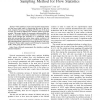108 search results - page 8 / 22 » Computational Methods for Oblivious Equilibrium |
NIPS
2007
15 years 3 months ago
2007
Extensive games are a powerful model of multiagent decision-making scenarios with incomplete information. Finding a Nash equilibrium for very large instances of these games has re...
COR
2008
15 years 2 months ago
2008
Discrete-time optimal control problems arise naturally in many economic problems. Despite the rapid growth in computing power and new developments in the literature, many economic...
112
click to vote
CSE
2009
IEEE
15 years 8 months ago
2009
IEEE
—Flow statistics is a basic task of passive measurement and has been widely used to characterize the state of the network. Adaptive Non-Linear Sampling (ANLS)is one of the most a...
114
click to vote
QSHINE
2009
IEEE
15 years 8 months ago
2009
IEEE
Abstract. In this paper, a radio resource sharing scheme for wireless cellular network is investigated to achieve efficiency and fairness among base stations. We propose a credit-t...
126
click to vote
FMCO
2004
Springer
15 years 7 months ago
2004
Springer
In 2-player non-zero-sum games, Nash equilibria capture the options for rational behavior if each player attempts to maximize her payoff. In contrast to classical game theory, we ...

